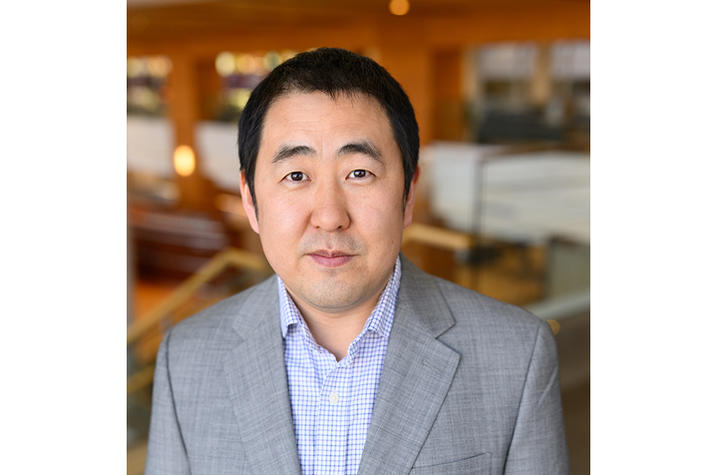Markey researcher awarded $2.6 million to study new metastatic lung cancer target

LEXINGTON, Ky. (Jan. 26, 2024) — A University of Kentucky Markey Cancer Center researcher has received a $2.6 million grant from the National Cancer Institute (NCI) to study a newly discovered enzyme linked to lung cancer progression.
Houfu Guo, Ph.D., an assistant professor in the UK College of Medicine’s Department of Molecular and Cellular Biochemistry, aims to understand how the enzyme LH2b contributes to metastasis, the spread of cancer cells from the original tumor to other parts of the body. The study’s findings could lead to the development of new drugs that target LH2b and stop or prevent lung cancer progression.
Guo's lab focuses on collagen, a protein that forms a supportive network around cells. Tumors can remodel collagen to create favorable environments for tumor dissemination and colonization to other parts of the body, but how that happens is not fully understood. Guo’s lab recently discovered that LH2b, a collagen modifying enzyme, could play a key role. The research found that high levels of LH2b predicted worse outcomes for lung cancer patients, while LH2b depletion stopped progression in lung cancer models.
The five-year NCI grant will support Guo’s research to explore LH2b’s prevalence in lung cancer patients and understand its mechanisms of action.
"We believe that LH2b promotes metastasis by modifying collagen in a way that helps cancer cells spread,” said Guo. “This grant will allow us to investigate this process in more detail, a step that will bring us closer to new effective therapies against lung cancer metastasis.”
The findings could also add to the understanding of progression of other cancers – expression of LH2 is linked to the growth of multiple cancers including lung cancer, breast cancer, and sarcoma.
Project co-investigators include Li Chen, Ph.D., in the UK College of Medicine’s Department of Internal Medicine, Mitsuo Yamauchi, D.D.S., Ph.D., at The University of North Carolina at Chapel Hill, and Bo Liang, Ph.D., at Emory University.
Research reported in this publication was supported by the National Cancer Institute of the National Institutes of Health under Award Number R01CA278989. The content is solely the responsibility of the authors and does not necessarily represent the official views of the National Institutes of Health.
UK HealthCare is the hospitals and clinics of the University of Kentucky. But it is so much more. It is more than 10,000 dedicated health care professionals committed to providing advanced subspecialty care for the most critically injured and ill patients from the Commonwealth and beyond. It also is the home of the state’s only National Cancer Institute (NCI)-designated Comprehensive Cancer Center, a Level IV Neonatal Intensive Care Unit that cares for the tiniest and sickest newborns and the region’s only Level 1 trauma center.
As an academic research institution, we are continuously pursuing the next generation of cures, treatments, protocols and policies. Our discoveries have the potential to change what’s medically possible within our lifetimes. Our educators and thought leaders are transforming the health care landscape as our six health professions colleges teach the next generation of doctors, nurses, pharmacists and other health care professionals, spreading the highest standards of care. UK HealthCare is the power of advanced medicine committed to creating a healthier Kentucky, now and for generations to come.




